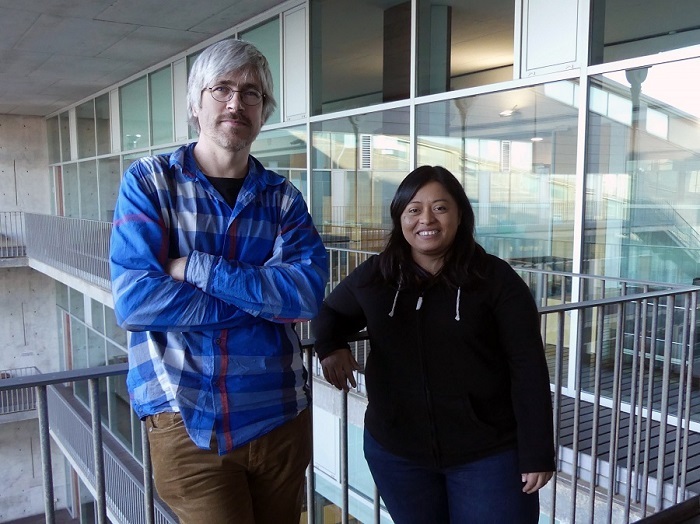“From research we contribute to the University’s social function”
“From research we contribute to the University’s social function”
We spoke to Ferran Casals, head of the Genomics Service at UPF and Nury Cecilia Rivas, who is on a training stage at UPF as part of a project which aims at identifying missing children during the civil war in El Salvador.

Using forensic genetics to identify missing children during the civil war in El Salvador is the basis of a project that has recently received a grant from the Catalan Agency for Development Cooperation (ACCD). The initiative is the result of collaboration between the Genomics Service of the Department of Experimental and Health Sciences (DCEXS), UPF Solidària, and the associations Pro-Búsqueda and Red de Solidaridad para la Transformación Social (REDS).
We spoke to Ferran Casals, head of the Genomics Service at UPF and Nury Cecilia Rivas, a coroner at the University of El Salvador (UES), who is on a training stage at UPF as part of the project.
—What are the general goals of the project?
Ferran Casals (FC): The idea is to analyse samples and contribute to the creation of a genetic database to use in the identification of missing persons in El Salvador. When identifications are made, it is very important to know the frequency of the different markers of a population, I mean, knowing whether a sample corresponds to one person or another helps us to discover the genetics of the population. To create the database of gene frequencies we used about 500 samples from anonymous donors. This will allow us for the first time to genetically characterize the population of El Salvador in depth. The other part of the project, which is equally important, is to continue training researchers at the UES, which we already began a couple of years ago. Then, Tania Cuadra and Celia Yanira came to learn about new techniques of DNA sequencing. Now, Nury has come to be with us, the team at the Genomics lab, for a month.
I think this project is a clear example of how genetics can contribute to improving people's lives.
—What does this stay at the Genomics Service consist of?
Nury Cecilia Rivas (NR): On this training stage I'm learning techniques related to the database we will set up in El Salvador. Specifically, applying latest-generation sequencing technologies to forensic genetics.
FC: During her first week here, Nury was able to attend a course in forensic genetics pertaining to the master's degree in Biological Anthropology, organized jointly by the UAB and the UB. The other three weeks of training are with us at the Genomics Service. She is also involved in other projects in which we are using different forensic genetics technologies, such as the one used for the mass graves of the Spanish Civil War.
—How did you hear about the project?
NR: I found out about the work of Pro-Búsqueda through its geneticist, Patricia Vásquez, who is also a professor at the University. I started participating in the process of sampling and that's how I joined the project. Previously, only samples from the capital had been taken into account, but in this study the 14 departments that make up El Salvador were included. So, we took samples of people born in each of the areas to give the study greater significance.
Genetics enables us to locate children who were separated from their families or died during the armed conflict.
—What would you highlight about the project?
NR: I think this project is a clear example of how genetics can contribute to improving people's lives. In Pro-Búsqueda, currently genetics enables us to locate children who were separated from their families or died during the armed conflict, to be able to achieve identification and reunite them with their families, who are looking for them. So far, 444 cases have been solved of which 277 have been reunited, both in our country and abroad, and 82 had died. There's still some way to go, but we've done a great job.
FC: I would like to emphasize that we are a university laboratory and as such, we participate in the main tasks of the University, teaching and research, but also in its social function. In this way, we also contribute from research to this social function of the University. Another interesting aspect of this project is that, somehow, it’s beginning a collaboration in the field of research and training, between UPF and the UES.
—What would you like to achieve in the near future?
NR: Pro-Búsqueda focuses on finding children who went missing during the armed conflict and for this they already have a genetic database of their own. Now we want to add this new gene bank we are performing, so it can also facilitate the search for missing adults. We also hope that the bank will be used in the near future to begin a process of improving the procedures we use for the identification of missing persons in our country. Personally, I want to continue my education in the area of genetics and collaborating with Pro-Búsqueda. When I return, I hope to apply the processing to be able to continue with the database and share the knowledge gained with my colleagues who are also specializing in forensic medicine.
